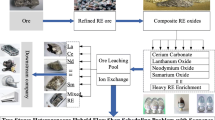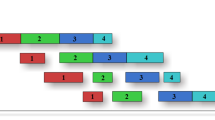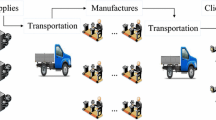Abstract
In this paper, an enhanced estimation of distribution algorithm (EEDA) is proposed to solve the hybrid flow-shop scheduling problem with identical parallel machines to minimize makespan. To evaluate the individuals, some decoding rules including the improved permutation scheduling rule, the improved list scheduling rule and the backward scheduling rule are designed for the permutation-based encoding scheme, and then a hybrid decoding method is proposed. To describe the distribution of the solution space for the EEDA, a probability model is built and used to generate new individuals by sampling. To well trace the region with promising solutions, a mechanism is provided to update the model with the superior sub-population. To enhance the exploitation capability, multiple local search operators are incorporated in the framework of the EEDA. The influence of the parameter setting is investigated based on the Taguchi method of design-of-experiment. Extensive numerical testing results based on sets of the well-known benchmarks and the comparisons with some existing algorithms demonstrate the effectiveness of the proposed algorithm.
Similar content being viewed by others
References
Wang L (2003) Shop scheduling with genetic algorithms. Tsinghua University & Springer Press, Beijing
Wang L, Xu Y, Zhou G, Wang SY, Liu M (2012) A novel decoding method for the hybrid flow-shop scheduling problem with multiprocessor tasks. Int J Adv Manuf Technol 59(9–12):1113–1125
Hakimzadeh Abyaneh S, Zandieh M (2012) Bi-objective hybrid flow shop scheduling with sequence-dependent setup times and limited buffers. Int J Adv Manuf Technol 58(1–4):309–325
Ziaeifar A, Tavakkoli-Moghaddam R, Pichka K (2012) Solving a new mathematical model for a hybrid flow shop scheduling problem with a processor assignment by a genetic algorithm. Int J Adv Manuf Technol 61(1–4):339–349
Javadian N, Fattahi P, Farahmand-Mehr M, Amiri-Aref M, Kazemi M (2012) An immune algorithm for hybrid flow shop scheduling problem with time lags and sequence dependent setup times. Int J Adv Manuf Technol 63(1–4):337–348
Mousavi SM, Zandieh M, Amiri M (2011) An efficient bi-objective heuristic for scheduling of hybrid flow shops. Int J Adv Manuf Technol 54(1–4):287–307
Gholami M, Zandieh M, Alem-Tabriz A (2009) Scheduling hybrid flow shop with sequence-dependent setup times and machines with random breakdowns. Int J Adv Manuf Technol 42(1–2):189–201
Ruiz R, Vázquez-Rodríguez JA (2010) The hybrid flow shop scheduling problem. Eur J Oper Res 205(1):1–18
Ribas I, Leisten R, Framinan JM (2010) Review and classification of hybrid flow shop scheduling problems from a production system and a solutions procedure perspective. Comput Oper Res 37(8):1439–1454
Gupta JND (1988) Two-stage hybrid flow shop scheduling problem. J Oper Res Soc 39(4):359–364
Portmann MC, Vignier A, Dardilhac D, Dezalay D (1998) Branch and bound crossed with GA to solve hybrid flowshops. Eur J Oper Res 107(2):389–400
Soewandi H, Salah EE (2003) Sequencing on two-stage hybrid flowshops with uniform machines to minimize makespan. IIE Trans 35(5):467–477
Rashidi E, Jahandar M, Zandieh M (2010) An improved hybrid multi-objective parallel genetic algorithm for hybrid flow shop scheduling with unrelated parallel machines. Int J Adv Manuf Technol 49(9–12):1129–1139
Moursli O, Pochet Y (2000) A Branch-and-Bound algorithm for the hybrid flowshop. Int J Prod Econ 64(1–3):113–125
Santos DL, Hunsucker JL, Deal DE (2001) On makespan improvement in flow shops with multiple processors. Prod Plan Control 12(3):283–295
Xiao W, Hao P, Zhang S, Xu X (2000) Hybrid flow shop scheduling using genetic algorithms. In: Proc of the 3rd World Congress on Intelligent Control and Automation. China, pp. 537–541
Jin H, Yang Z, Ito Z (2006) Metaheuristic algorithms for the multistage hybrid flowshop scheduling problem. Int J Prod Econ 100(2):322–334
Alaykyran K, Engin O, Döyen A (2007) Using ant colony optimization to solve hybrid flow shop scheduling problems. Int J Adv Manuf Technol 35(5–6):541–550
Niu Q, Zhou T, Ma S (2009) A quantum-inspired immune algorithm for hybrid flow shop with makespan criterion. J Univers Comput Sci 15(4):765–785
Engin O, Döyen A (2004) A new approach to solve hybrid flow shop scheduling problems by artificial immune system. Futur Gener Comput Syst 20(6):1083–1095
Kahraman C, Engin O, Kaya I (2008) An application of effective genetic algorithms for solving hybrid flow shop scheduling problems. Int J Comput Intell Syst 1(2):134–147
Liao JC, Tjandradjaja E, Chung TP (2012) An approach using particle swarm optimization and bottleneck heuristic to solve hybrid flow shop scheduling problem. Appl Soft Comput 12(6):1755–1764
Larranaga P, Lozano JA (2002) Estimation of distribution algorithms: a new tool for evolutionary computation. Kluwer Press, Boston
Ceberio J, Irurozki E, Mendiburu A, Lozano JA (2012) A review on estimation of distribution algorithms in permutation-based combinatorial optimization problems. Progress Artif Intell 1(1):103–117
Baluja S (1994) Population-based incremental learning: a method for integrating genetic search based function optimization and competitive learning. Technical Report CMU-CS-94-163. Carnegie Mellon University, Pittsburgh
Mühlenbein H, Paass G (1996) From recombination of genes to the estimation of distributions I: binary parameters. Lect Notes Comput Sci 1141:178–187
Harik GR, Lobo FG, Goldberg DE (1999) The compact genetic algorithm. IEEE Trans Evol Comput 3(4):287–297
De Bonet JS, Isbell CL Jr, Viola P (1997) MIMIC: Finding optima by estimating probability densities. In: Advances in Neural Information Processing Systems. MIT Press, Cambridge, pp 424–430
Baluja S, Davies S (1997) Using optimal dependency-trees for combinatorial optimization: Learning the structure of the search space. In: Proc of the 14th Int Conf on Machine Learning. San Francisco, pp. 30–38
Pelikan M, Mühlenbein H (1999) The bivariate marginal distribution algorithm. In: Benítez JM (ed) Advances in soft computing—engineering design and manufacturing. Springer, London, pp 521–535
Mühlenbein H, Mahnig T (1999) Convergence theory and applications of the factorized distribution algorithm. J Comput Inf Technol 7(1):19–32
Harik G (1999) Linkage learning via probabilistic modeling in the ECGA. IlliGAL Report NO. 99010, Illinois Genetic Algorithms Laboratory. University of Illinois at Urbana-Champaign, Illinois
Pelikan M, Goldberg DE, Cantú-Paz E (1999) BOA: The bayesian optimization algorithm. In: Proc of the Genetic and Evolutionary Computation. San Francisco, pp. 525–532
Saeys Y, Degroeve S, Aeyels D, Van de Peer Y, Rouze P (2003) Fast feature selection using a simple estimation of distribution algorithm: a case study on splice site prediction. Bioinformatics 19(2):179–188
Cesar RM, Bengoetxea E, Bloch I, Larranaga P (2005) Inexact graph matching for model-based recognition: evaluation and comparison of optimization algorithms. Pattern Recognit 38(11):2099–2113
Sagarna R, Lozano J (2005) On the performance of estimation of distribution algorithms applied to software testing. Appl Artif Intell 19(5):457–489
Jarboui B, Eddaly M, Siarry P (2009) An estimation of distribution algorithm for minimizing the total flowtime in permutation flowshop scheduling problems. Comput Oper Res 36(9):2638–2646
Pan QK, Ruiz R (2012) An estimation of distribution algorithm for lot-streaming flow shop problems with setup times. Omega 40(2):166–180
Zhang Y, Li XP (2011) Estimation of distribution algorithm for permutation flow shops with total flowtime minimization. Comput Ind Eng 61(2):706–718
Tzeng YR, Chen CL, Chen CL (2012) A hybrid EDA with ACS for solving permutation flow shop scheduling. Int J Adv Manuf Technol 60(9–12):1139–1147
Wang L, Fang C (2012) An effective estimation of distribution algorithm for the multi-mode resource-constrained project scheduling problem. Comput Oper Res 39(2):449–460
Wang L, Wang SY, Fang C (2012) An effective hybrid EDA-based algorithm for solving multidimensional knapsack problem. Expert Syst Appl 39(5):5593–5599
Wang L, Wang SY, Xu Y, Zhou G, Liu M (2012) A bi-population based estimation of distribution algorithm for the flexible job-shop scheduling problem. Comput Ind Eng 62(4):917–926
Wang SY, Wang L, Xu Y, Liu M (2013) An effective estimation of distribution algorithm for the flexible job-shop scheduling problem with fuzzy processing time. Int J Prod Res. doi:10.1080/00207543.2013.765077
Wang L, Wang SY, Liu M (2012) A Pareto-based estimation of distribution algorithm for the multi-objective flexible job-shop scheduling problem. Int J Prod Res. doi:10.1080/00207543.2012.752588
Carlier J, Néron E (2000) An exact method for solving the multi-processor flow-shop. RAIRO-Oper Res 34(1):1–25
Montgomery DC (2005) Design and analysis of experiments. Wiley, Arizona
Neron E, Baptiste P, Gupta JND (2001) Solving hybrid flow shop problem using energetic reasoning and global operations. Omega 29(6):501–511
Author information
Authors and Affiliations
Corresponding author
Rights and permissions
About this article
Cite this article
Wang, Sy., Wang, L., Liu, M. et al. An enhanced estimation of distribution algorithm for solving hybrid flow-shop scheduling problem with identical parallel machines. Int J Adv Manuf Technol 68, 2043–2056 (2013). https://doi.org/10.1007/s00170-013-4819-y
Received:
Accepted:
Published:
Issue Date:
DOI: https://doi.org/10.1007/s00170-013-4819-y




